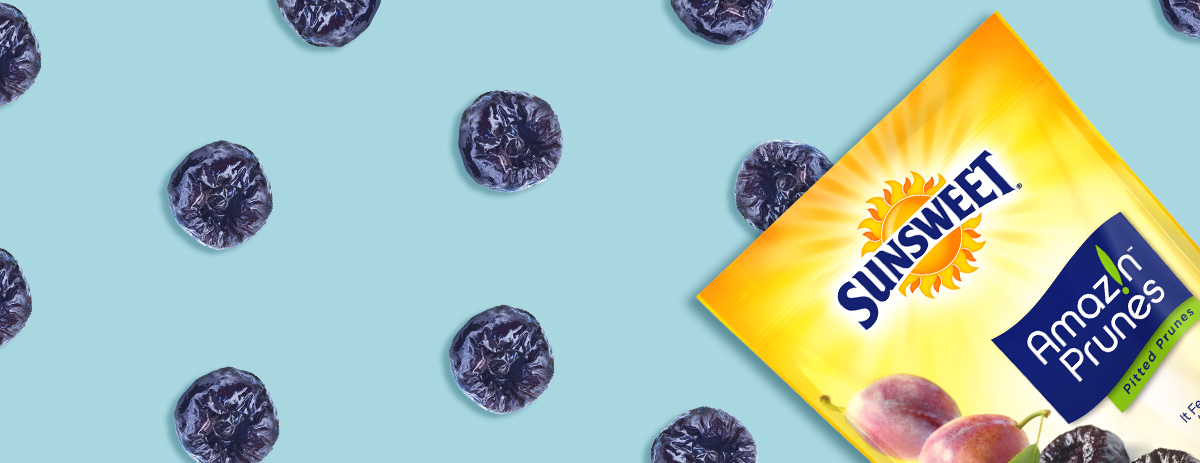
Yuba City, CA (Jan. 14, 2021) – Recommitting to your health and wellbeing in the new year can be a little daunting if you aren’t sure where to start. However, simply adding in small changes to your daily routine and making a habit of prioritizing your health can help you to reap the long-term benefits of a healthier lifestyle. Make this your feel-good year with help from Sunsweet’s Amaz!n Prunes and Prune Juice, a delicious and easy way to give your body a nutritious boost.
“The benefits of prunes and prune juice when consumed regularly are significant. This time of year is a wonderful moment to start a new routine and discover superfoods like prunes and prune juice,” said Stephanie Harralson, Director of Marketing, North America, at Sunsweet Growers Inc.
Digestive health is often the first benefit that people think of when considering the merits of prunes and prune juice. With 3 grams of fiber in a serving of prunes and 4 grams in a serving of prune juice, prunes and prune juice are a good source of fiber – and fiber has been known to help keep you feeling fuller for longer. Prunes and prune juice also contain both soluble and insoluble fiber as well as key nutrients that help regulate the digestive system. By consuming prunes and prune juice daily, you can help your digestion to be more regular.
Surprisingly, bone health is another benefit provided by prunes. It is estimated that 40% of post-menopausal women and 30% of men will suffer from a fracture caused by osteoporosis during their lifetime. Research shows that eating 5-6 prunes each day may help to prevent bone loss. With vitamins and minerals - like potassium, magnesium and vitamin K - prunes are an easy way to begin building better bones at any stage in life.
Prunes may also be beneficial for heart health. Prunes are a good source of fiber and contain no sodium or added sugar. Fiber has specifically been linked to heart health, and in high amounts, may help to lower the risk of heart disease. Better yet? A study from UC Davis found that eating just 10-12 prunes daily lowered LDL cholesterol levels in men1,2. Helping give your heart health a boost has never been sweeter.
Prunes and prune juice are also easy to work into your day. Craving an afternoon snack? Prunes have a low glycemic index, no added sugar and are only 100-calories per serving – it’s the perfect snack to help keep your day on track. You could also try blending up a Pruney-Fruity Smoothie with prune juice, whipping up Crispy Quinoa Cakes & Leafy Green Salad boosted with prunes, or mixing together Breakfast Chia Pudding naturally sweetened with prune puree. Whatever you choose to whip up this year, just remember to drop prunes and prune juice into your grocery cart to reap the rewards of regular consumption.
Learn more about the benefits of prunes and prune juice and discover easy recipes to incorporate these foods into every lifestyle at sunsweet.com.
About SUNSWEET
Sunsweet Growers Inc., established in 1917, has over 100 years of experience and heritage in producing the highest quality dried fruits. The Yuba City, Calif.-based cooperative of 200+ grower/members is the worldwide leader in prunes and related products. Most recently, the product portfolio has been expanded to include a full line of dried fruit snacks and juices, all designed to fit today’s need for healthy and convenient food choices. For more on Sunsweet products, visit www.Sunsweet.com
Contact:
Marley Vebares
[email protected]
(717)-650-7427
1Pereira MA, O'Reilly E, Augustsson K, et al. Dietary fiber and risk of coronary heart disease: a pooled analysis of cohort studies. Arch Intern Med. 2004; 164:370–6.
2Tinker LF, Schneeman BO, Davis PA, Gallaher DD, Waggoner CR. (1991) Consumption of prunes as a source of dietary fiber in men with mild hypercholesterolemia. American Journal of Clinical Nutrition 53, 1259–1265.